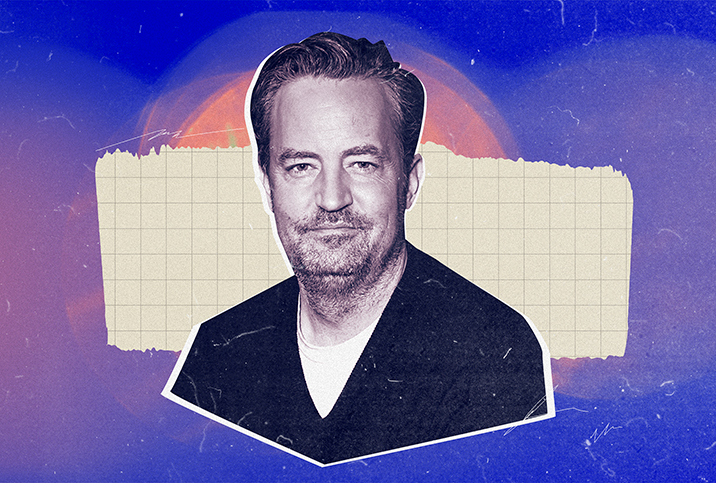Former 'Friends' Star Matthew Perry Opens Up on ED, Other Struggles

Actor Matthew Perry, best known for his role as Chandler Bing on the ever-popular 1990s sitcom "Friends," recently released a new memoir, "Friends, Lovers and the Big Terrible Thing." In the book, he opens up on a number of topics, from his love life to his struggles with drug and alcohol addiction.
Perry starred as Bing, known for his sarcastic wit, for 10 seasons on one of the most popular American television shows of all time. In doing so, he became one of the most recognizable actors of the '90s and early 2000s.
But as he details in his memoir, according to reports, Perry struggled with alcohol and drug use, even during the peak of the "Friends" run. Those struggles affected everything from his love life to his relationships with his co-stars and caused a plethora of health issues. Eventually, he fell into a coma and spent two weeks on life support.
Not to be lost in the shuffle, however, are the actor's admitted struggles with erectile dysfunction (ED), resulting from his heavy alcohol use. It may not be a life-threatening disease, but ED is a life-altering sexual issue, whether you're in your 30s or your 60s.
ED and other health issues
Perry was diagnosed with pancreatitis at age 30 due to substance use disorder. At age 49, however, he nearly died after his colon exploded following years of opioid use. He was in a coma and on life support for two weeks. He then spent another five months in the hospital and nine months attached to a colostomy bag, which collects stool and hangs outside the body.
"My therapist said to me, 'The next time you think about OxyContin, I want you to think about living out the rest of your days with a colostomy bag,'" he writes in the book, according to a story published by USA Today. "Having had a colostomy bag for nine long months, my therapist's words hit hard."
With alcohol and drug abuse comes a litany of other health issues, including erectile dysfunction, which Perry experienced during his 30s.
In the memoir, he details trying to have sex but failing to get an erection because of the "six beers he had beforehand," according to an article in OK! magazine.
ED is more common with age, but it can be an issue for younger men, too.
Erectile dysfunction is a common problem
While it may seem isolating, ED is relatively common. It affects at least 30 million men in the United States, according to the National Institute of Diabetes and Digestive and Kidney Diseases.
Some risk factors for erectile dysfunction include:
- Age (most commonly men older than 40)
- Certain diseases or conditions, such as diabetes
- Certain medications
- Certain psychological or emotional issues, such as depression and anxiety
However, a 2017 study in the journal Translational Andrology and Urology found problems with ED are becoming more prevalent in men younger than 40.
Behaviors that affect general health, such as alcohol and drug use, and a lack of exercise, also put men at risk for ED. Obesity is a risk factor, too.
How substance use can cause ED
The term "whiskey dick" remains in popular parlance, but despite its boorish connotation, there is science behind it. Sexual dysfunction—in this case, erectile dysfunction—is commonly associated with substance use.
The human sexual response cycle consists of arousal, plateau, orgasm and resolution, according to a 2019 study published in the Journal of Psychosexual Health. Those phases are influenced by the workings of the central and autonomic systems in the body. If there's a disconnection somewhere along the line, sexual dysfunction can result.
Alcohol depresses the central nervous system. Psychologically, you may be more aroused when you're drinking; physiologically, not so much. If lifestyle changes improve your overall health but erectile dysfunction persists, even intermittently, a wearable device free of the side effects of medication may help restore sexual function.Eddie® is an FDA-registered Class II medical device designed to treat erectile dysfunction and improve male sexual performance. Its subtle size and fast-acting results allow you to treat your ED with more control.
Chronic use of opioids also affects erectile function in men. The excessive use of drugs such as OxyContin reduces the body's luteinizing hormone, which is responsible for stimulating the processes in the body that are required for sexual health, development and reproduction.
A 2017 study in the Journal of Sexual Medicine reviewed 10 studies concerning opioid use and ED. It determined the use of such drugs was significantly associated with an increased risk of erectile dysfunction. Researchers also found that men younger than age 50, a group at higher risk for opioid abuse, were especially vulnerable.
It's OK to talk about it
Many men, especially younger men—say people around age 30, like Perry was when he first began to experience alcohol-related ED—are more likely to feel ashamed or ignore sexual dysfunction altogether.
But as the actor proves in his memoir, it's OK to talk about erectile dysfunction. It's OK to talk to a doctor, explain your symptoms and get help. They may put your mind at ease by explaining the causes or prescribing medication or therapy to help the situation.
If you don't have a primary care physician, or prefer to talk with someone new for any reason, video visits have become a viable option for most people. Physicians and therapists, too, have recognized the efficacy of video consultations. To make it easier to connect with a healthcare professional, Giddy telehealth offers a portal featuring same-day appointments and affordable care.


















